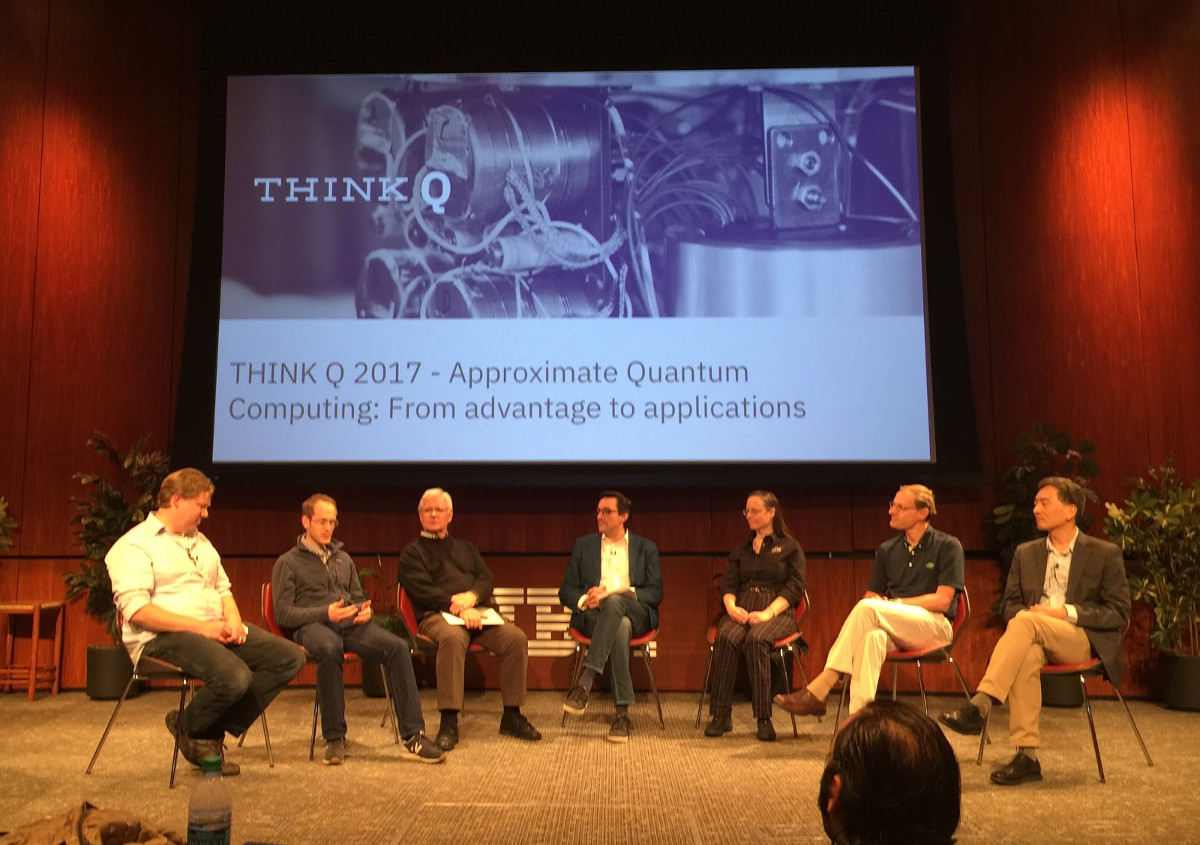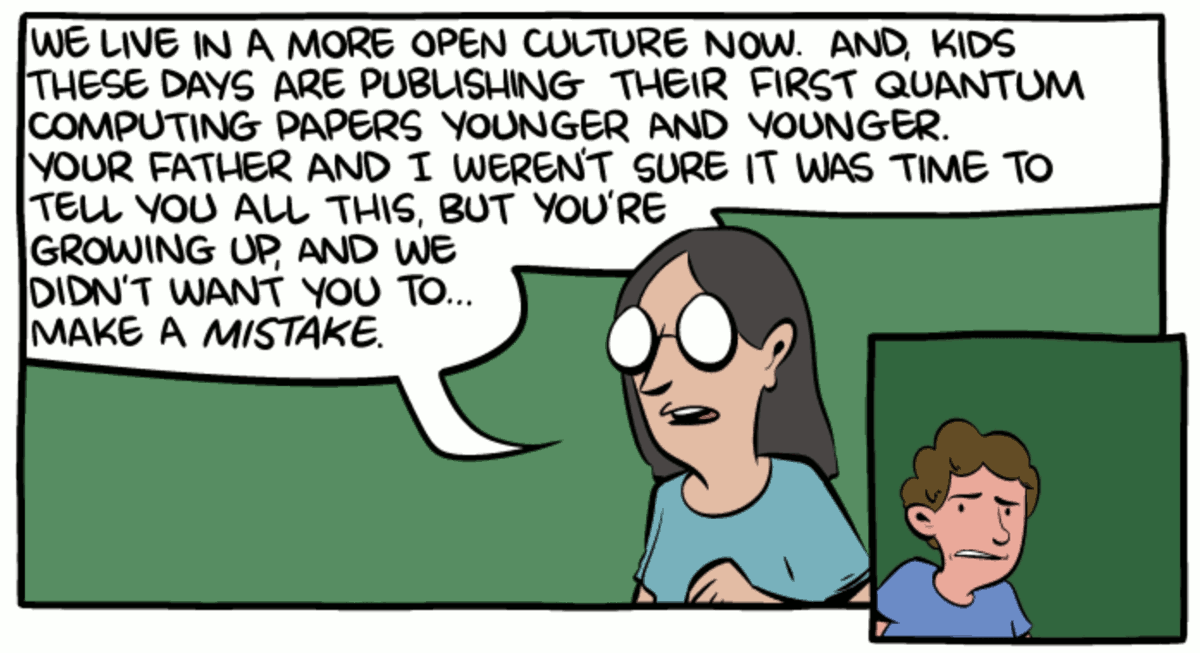Editor’s note: At the conclusion of the conference, the Vice President of IBM Q, Dario Gil, convened a panel discussion of quantum computing experts from industry and academia. They discussed the current outlook as well as the future of quantum computation. The three of us (Eddie Schoute, Andrew Guo, and Aniruddha Bapat) had a conversation about the themes brought up during the discussion.
 The ThinkQ 2017 Panel consisted of (left-to-right): Dave Bacon (Google), Andrew Childs (U. of Maryland), Richard Jozsa (U. of Cambridge), Dario Gil (IBM Q), Eleanor Rieffel (NASA), Matthias Steffen (IBM), and Jungsang Kim (Duke U., IonQ).
The ThinkQ 2017 Panel consisted of (left-to-right): Dave Bacon (Google), Andrew Childs (U. of Maryland), Richard Jozsa (U. of Cambridge), Dario Gil (IBM Q), Eleanor Rieffel (NASA), Matthias Steffen (IBM), and Jungsang Kim (Duke U., IonQ).
Eddie: Andrew and Ani, I have to ask you what you thought about the ThinkQ conference.
Andrew: It was an excellent conference, and IBM was a gracious host. Personally, I thought the best sound-bytes came at the end, during the panel discussion with experts from both industry and academia. Dario Gil, the senior executive in charge of IBM Q, certainly did a nice job moderating this “ThinkQ&A.”
Ani: I agree, the conference was very well-organized (kudos to IBM), and I felt that the panel discussion effectively brought together many of the themes that had informed the talks, posters, and even the conversations over coffee or lunch. One theme that came up a lot during the discussion was the the joint role of industry and academia in quantum computing, and the selection of panelists seemed to reflect that reality.
Eddie: Academia is hesitant to accept industry in the development of the field. A decent amount of time was spent on this topic at the panel discussion. I can understand some of the concerns: Academic freedom must be maintained. As researchers we should be able to work on topics that do not seem to have direct applications. There were multiple panelists expressing concern over their ability to stay independent of industry interests; I feel that the independent process should be defended by academia.
Andrew: I think that the freedom of academics to pursue knowledge without direct application is not particularly at risk at the moment. Currently, governments still provide the bulk of the funding for research in quantum information. And given the field’s relevance to national cybersecurity, I do not foresee that dynamic shifting anytime soon. What could be problematic is if industrial partners were to use their private capital to fund individual academic research projects directly; that could lead to conflicts of interest, which would impact the credibility of the research. So far, it seems companies are content with funding in-house research teams and sponsoring academic conferences—not a bad deal for us!
Eleanor Rieffel brought up another, more subtle issue: whether industrial involvement might shift the culture of the field from its current atmosphere—one of open academic collaboration—to a more restrictive and competitive environment. Such pressures may stem from market forces, or the overall “hype” from media publicity. If researchers feel compelled to seek patents for their quantum algorithms or chip fabrication techniques, it could stifle innovation and impede the field’s overall progress.
This is a very open field, with everybody talking to everybody, and I’ve started to have a little bit of a fear of a change in culture because of the market forces and the hype. I think we all need to push against that.
Ani: I generally agree that right now, the spirit of long-term academic pursuit and open collaboration in quantum computing (QC) seems to be safe from “market forces,” which—very broadly—incentivize quick results and being possessive about intellectual property. However, as we get closer to having commercial QC devices, companies (and the research groups they support) might be forced to change strategy and look exclusively to the near-term.
Andrew: Right. And the desire for quick results could certainly lead to a culture of “moving fast and break things,” a philosophy to which a number of start-ups tend to ascribe. As cautionary tale, recall the enormous media hype behind D-Wave Technologies in the early 2010s. The Vancouver-based start-up bucked the academic consensus that one must build a “universal” quantum computer to accrue a quantum computational advantage, and instead developed a quantum annealer that can only tackle highly constrained problems—ones for which there’s no guarantee of a quantum speed-up. D-Wave effectively chose quantity over quality by creating devices with thousands of qubits with poor coherence times. Such behavior threatens a “race to the bottom,” where upstart companies would use their marketing heft to capitalize on hype and end up building “quantum” computers that are no more powerful than classical ones.
Eddie: It is probably not fair to have such an antagonistic view of “industry”; I do seem to recall some very successful research groups at various companies, e.g. Microsoft, Google and IBM, so I do think there is potential for a synergistic existence. Even now, I do not think that other fields with a significant industry influence such as Computer Science are doing so poorly. Industry interest also drives general interest, resulting in more potential candidates for research—another goal both Jungsang Kim and Eleanor Rieffel saw worthy of mention in the panel discussion.
Ani: Good or bad, change is coming, and many in the panel addressed research strategies in the “post-industrial” scenario. For instance, Jungsang Kim said that we should expect a kind of tipping point, much like the one we saw in Silicon Valley. He basically argued that in the next (say) five years, the stakes will raise dramatically, and our approach (as a community) to the research will determine our success in producing good QC devices.
There were a few different aspects to this argument: first, that we should maintain a healthy balance of skeptics and “believers”—i.e. people who are motivated and optimistic enough about their own ideas to see them through to the bitter end. Moreover, we need a kind of brute-force, distributed approach, where we attract many young and smart people into the field and make research tools (such as IBM’s quantum computer) available to the community at large. This way, we expand the scope of explored possibilities and increase the probability of finding promising applications early on. Indeed, the spirit of open collaboration is a big part of this.
Eddie: IBM has had a cloud QC platform for a long time now, and so has the University of Bristol. I would predict that most groups with a reliable QC will make available their devices to the general public (possibly at cost). There is currently just not enough demand for quantum devices for parties to purchase and maintain hardware themselves. Currently known applications are mostly aimed at large scale devices, but most would admit that they are scrambling to find “killer” applications for a small device.
Barring some significant breakthrough it will take a while for the general public to have a reason to interface with quantum devices. I am also fairly skeptic of the position of Dave Bacon that opening up quantum computers to the general public would lead to a flood of new ideas since much of what is quantum is so unintuitive.
Andrew: Certainly in the near-term, giving the public access to the current generation of devices will have little scientific impact. But even a trickle of interest today could have a big impact downstream, especially in bringing forward a new generation of quantum researchers. As Richard Feynman once said, “We always have had … a great deal of difficulty in understanding the world view that quantum mechanics represents.” While older generations have struggled to “understand” quantum mechanics, today’s physicists are basically steeped in it. And the “modern” approach to teaching quantum has made it easier for us to wrap our heads around it—at least to the point where we can “shut up and compute.”
 “Kids these days are publishing their first QC papers younger and younger,”
courtesy of Scott Aaronson and (reproduced with permission of) Zach Weinersmith
“Kids these days are publishing their first QC papers younger and younger,”
courtesy of Scott Aaronson and (reproduced with permission of) Zach Weinersmith
Think of what could happen when programming a quantum computer comes as naturally as programming a classical computer does for many people today. Twenty year-old Bill Gates co-founded Microsoft; nineteen year-old Mark Zuckerberg created Facebook. Neither could’ve made his impact without early and consistent access to computers. Fast forwarding a few decades into the future, the “killer app” for a universal quantum computer might be devised by someone who hasn’t even been born yet!
Eddie: Maybe you’re right—I certainly hope so! Either way, making the quantum computation more accessible is a good thing. I also personally would like to involve more Computer Scientists in the field, but the right tools aren’t there yet. At least academia & industry are working hard to making the field more accessible and easier to interact with, which does give me hope for the future.
Ani: I agree that quantum “toys” and early devices will—in addition to guiding the development of commercial applications—become educational tools for a future generation of quantum computer scientists. I’m hopeful that people with academic and industry background and expertise will figure out their respective roles in this, and work together towards what one could call the technological integration of quantum computing into society. That’s certainly an exciting prospect!
Watch the video recording of the panel here